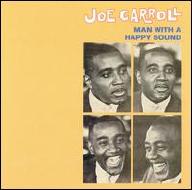While Gillespie is often considered a deity equal to Parker in the bebop creation myth, the type of vocal comedy and novelty song material which featured Carroll was actually more of a throwback to the repertoire of one of Gillespie's former bosses, Cab Calloway -- although simply not as funny. Calloway, by the way, absolutely hated bebop, referring to it as "Chinese music." Carroll wrote some of his own material, asking essential musical questions such as Got a Penny, Benny?. Jazz vocalists from subsequent generations, such as Mark Murphy and Jon Hendricks, have cited Carroll as an important influence; it was Hendricks who reported calling Carroll upon arriving at the Greyhound bus station in New York City, simply to ask "Where is Bird?"
Undeniably, Carroll represents an important transition in the role of vocalists in jazz, coming from an era when they were stuck on the sidelines, stepping forward to provide variety in the form of cornball humor, overt sentimentality, or simply sex appeal. Carroll himself was influenced by one of the great novelty jazz singers, Leo Watson. In contrast, singers such as Murphy or Hendricks became bandleaders and were considered fully capable of holding center stage for the entire length of a concert. While even a Carroll booster might not want to wish for such an event, the supply of good vibes present in just five minutes of the man's singing is a pretty good remedy for the world's troubles, if only temporarily. The title of Carroll's 1962 album on the Charlie Parker label, The Man with a Happy Sound, sums it up best. ~ Eugene Chadbourne, Rovi












